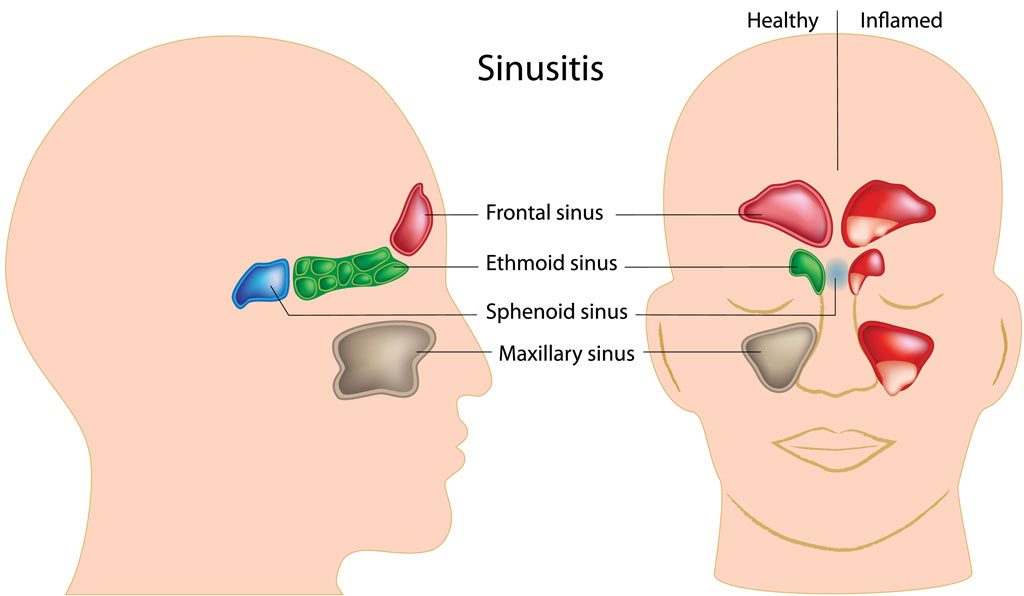Most sinus infections are caused by viruses and do not require antibiotics. Antibiotics are only helpful for confirmed or worsening bacterial sinus infections. Unnecessary antibiotic use can lead to side effects and antibiotic resistance. “When do I really need antibiotics for a sinus infection?” is a question many patients have when suffering from bothersome sinus and allergy problems. While sinus infections can be quite painful, antibiotics often do not help in treating the condition. Sinus infections affect approximately 37 million people in the U.S. each year and can be caused by:
Sinus infections affect approximately 37 million people in the U.S. each year and can be caused by:
- Viruses
- Bacteria
- Allergic rhinitis
- Nasal polyps or deviated septum causing nasal obstruction
- Irritants/pollutants
- Overuse of nasal decongestant spray
- Fungal infections
The majority of sinus infections are viral in nature, and antibiotics do not cure viral infections. Taking antibiotics for viral infections also will not:
- Keep you from being contagious to others
- Relieve symptoms or make you feel better
In order to distinguish a bacterial sinus infection from an infection caused by a virus or other contributing factor, your doctor will observe your symptoms and possibly conduct other tests, such as a CT scan or cultures. Antibiotics are only effective on bacterial infections, and even in cases involving bacteria, the body can often cure itself of mild or moderate infections within a few days.
Risk of Unnecessary Antibiotics for Sinus Infections
Taking unnecessary antibiotics for a sinus infection is not only ineffectual, but can actually be harmful to the patient. Risks of taking unneeded antibiotics include:
- Increased chance of getting an antibiotic-resistant infection at a later time
- Destruction of healthy stomach bacteria, which can allow harmful bacteria to grow
- Possible side effects, such as upset stomach, rash, or dizziness
- Allergic reaction
According to studies conducted by the American Academy of Allergy, Asthma, and Immunology (AAAAI), 60-70% of patients with sinus infections fully recover without the use of antibiotics. Additional research shows that almost 90% of U.S. adults diagnosed with acute sinusitis (infection lasting less than 4 weeks) are prescribed antibiotics. This overuse of antibiotics for sinus infections, as well as other conditions, can lead to antibiotic resistance, a state in which bacteria change over time as a reaction to antibiotic treatment, in order to survive and multiply, thus making the antibiotics less effective.
Antibiotic Resistance
Antibiotic resistance has become a major healthcare concern in recent years. Misuse and overuse of antibiotics are the primary causes of drug-resistant bacteria. Infections which were once easily treated with antibiotics are becoming more difficult to cure due to antibiotic resistance. Ineffective antibiotics can result in:
- Longer-lasting infections
- More severe illnesses
- Use of more expensive and stronger medications
Using antibiotics correctly and only when necessary for sinus infections will help combat antibiotic resistance and improve your overall health.
When to Use Antibiotics for Sinus Infections
If your sinusitis is caused by a bacterial infection, you may require antibiotics to get better. Typically, antibiotics are needed when:
- Sinus infection symptoms last over a week
- Symptoms worsen after starting to get better
- Sinusitis symptoms are severe (high fever, skin infection or rash, extreme pain or tenderness around the eyes or nose)
How to Treat Sinus Infections Without Antibiotics
While sinus infections caused by viruses, allergies, or other non-bacterial factors may not require antibiotics, they still cause the same symptoms which make you feel sick. Symptoms of a sinus infection include:
- Nasal congestion
- Headache
- Cough
- Pain or tenderness around the eyes, cheeks, or forehead
- Thick nasal or post-nasal drainage
Taking steps to alleviate your sinusitis symptoms is often the best treatment to lessen your discomfort. Sinus infection treatment options include:
- Drink plenty of fluids (warm liquids will aid in loosening mucus)
- Rest, especially the first few days, to help your body fight the infection
- Moisturize the air with a cool-mist vaporizer
- Elevate your head while sleeping to decrease post-nasal drip
- Take warm showers or baths, as steam can soothe your sore throat and loosen mucus
- Gargle with warm salt water for a sore throat
- Use saline nasal spray or nasal irrigation kit (such as a neti pot) to alleviate congestion
- Use over-the-counter treatments, such as nasal drops and sprays or pseudoephedrine pills, as your doctor recommends them
What Not to Do for a Sinus Infection
You should always follow your doctor’s instructions when you are diagnosed with a sinus infection. Do not:
- Ask for antibiotics if your doctor feels they are unnecessary
- Take antibiotics that are prescribed for someone else
- Skip doses of your antibiotics or stop taking your antibiotics early when your doctor prescribes them
- Save antibiotics for the next time you get sick
If you are experiencing symptoms of a sinus infection or are having sinus problems of any kind, please contact the Fort Worth ENT sinus specialists at The Fort Worth Sinus Center for an appointment.



